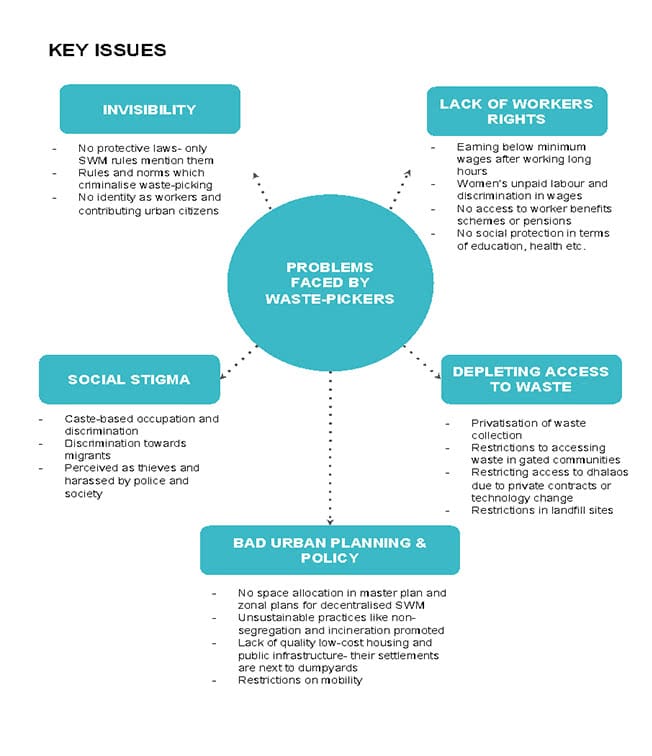Jagruti Devi is a waste picker and lives in the slums of Rangpuri Pahadi in Delhi. Her husband collects waste in the mornings and sells vegetables on a pushcart in the evenings, while Jagruti Devi segregates waste at home. Since the COVID-19 pandemic hit and the lockdown was put in place, her husband hasn’t been able to go out to collect waste or to sell vegetables.
“We haven’t been able to work since March. We have no savings left. If we can’t go back to work, I don’t know how we are supposed to survive,” Jagruti says.
The lack of income during the lockdown resulted in acute hunger for most of the urban poor in Delhi. When asked about food, Jagruti Devi showed her indomitable spirit, even in the face of the stark difficulties.
“They distributed rations in our colony. I had to go stand in line for three hours, but I was able to get some rations. It didn’t last very long because I also shared it with my neighbour. She’s old and she can’t go get anything for herself. I had to help her out too.”
Unacknowledged services
Jagruti Devi is one of the many informal waste pickers who make up 2-3 lakh of the city’s population and play a critical role in the city’s waste management system, as well as in providing environmental and public health benefits.
A single person on foot is estimated to collect, sort and transport 10-15 kilograms of waste a day in Delhi, while those with tricycle carts can collect 50 kilograms a day.

Informal waste pickers currently recycle 20 per cent of the total waste generated in Delhi, approximately 2500 tonnes per day (CSE, 2017; Chintan, 2018). Through recycling, waste pickers provide innumerable benefits to the city, such as lowering pressure on landfills, reducing the quantity of waste for incineration and preventing waste from piling up in streets and near homes, thus boosting public health.
In current times, however, informal waste pickers themselves face serious health and economic threats. Waste pickers are often the most vulnerable of the urban poor. Largely migrants belonging to lower castes, they live in slums with very poor infrastructure.
Since the pandemic hit, most haven’t been able to go out and collect waste. The majority of their earnings come from selling dry waste and recyclables to scrap dealers but due to the ongoing crisis in the country, these junk shops have also shut down. The lack of work has created a situation of absolute hunger and deprivation for many waste pickers. When they are able to step out of their homes for work, they face police harassment.
A recent study of women waste pickers during the lockdown in Delhi shows that a majority of respondents faced difficulties in going out to collect waste, one because police were patrolling the streets, and secondly, because they lack protective equipment. 68% of those interviewed reported that the shutting down of godowns and junk shops have made sorting and selling recyclables nearly impossible.
The study also reports that waste pickers faced a severe shortage of food and obstacles for accessing essential medicines and healthcare services. The severe impact of the pandemic on their life and livelihood means that, whenever possible, waste pickers are stepping out for work, unmindful of their own safety and health protection.
Post lockdown, many waste pickers have started going to work, but now they seem to be confronting another danger: the threat of infection without any protective equipment.
Waste pickers are on the frontline of defence against the spread of COVID-19, as they are managing the city’s waste while exposing themselves to disease and infection in the process.
Steps called for
As waste pickers resume work, the city needs to help protect them and their livelihoods:
- First, the government must acknowledge their role as essential and include them in the protection and insurance schemes for frontline workers. Their livelihood needs to be promoted and their health needs protection.
- The government should work to ensure provision of protective equipment like masks, gloves and boots, as well as sanitation products (soap and sanitisers).
- Living in some of the poorest slums of Delhi, waste pickers also need support for income and food security. An immediate cash transfer will help them recover from the economic impact of the lockdown on their lives.
- Finally, the government should work to ensure that waste pickers have access to regular health check-ups and essential medicines.
This post was published on WIEGO’s Delhi Dairy and has been republished with permission (with minimal edits). Read the original post here.
Also read
Delhi: 45 sanitation workers test positive for COVID, 15 succumb